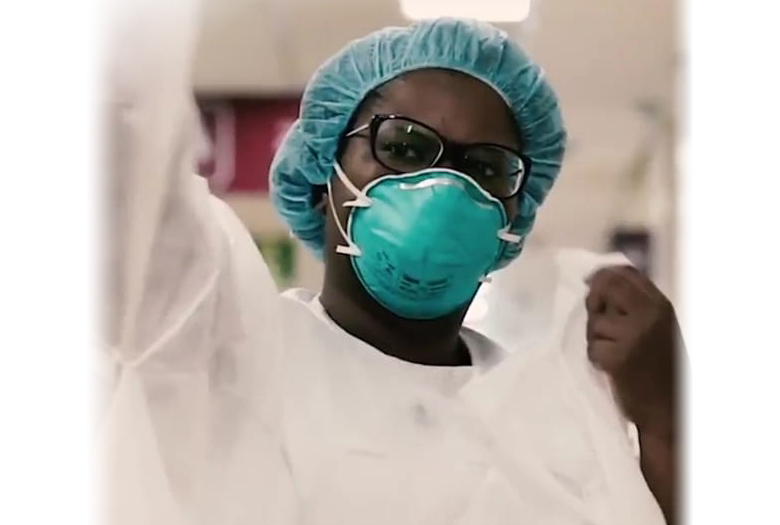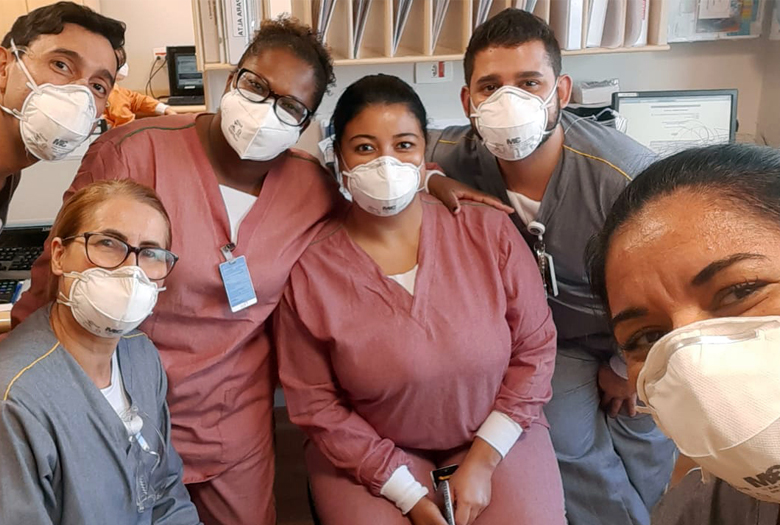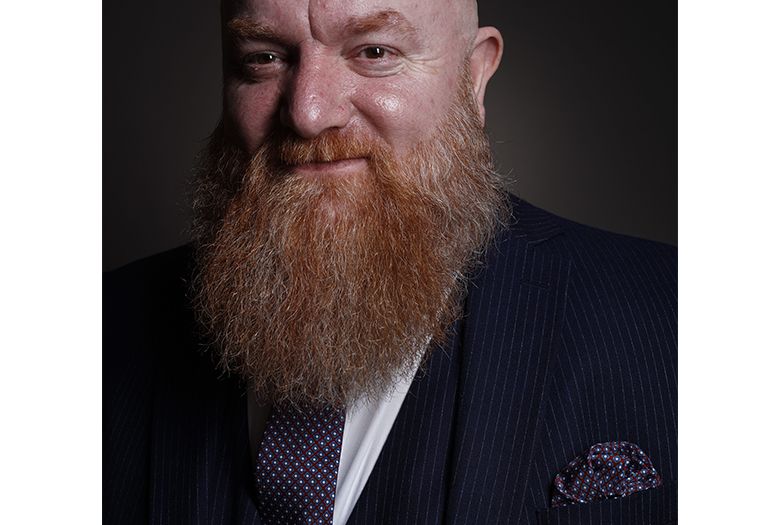Facing an invisible enemy
Janaína Maria Felix, stoma nurse, Brazil
I have been working as a nurse in a gastroenterology clinic for some time now, and I have developed an intense love for the specialty. I have discovered a magic to the gastrointestinal system. Like one of those 1000-piece puzzles, it is terrifying at the beginning and satisfying at the end; piece by piece, it fits perfectly.
‘what a gift it is to provide care for others’
Patients are always coming and going. There is a problem to diagnose, pain to relieve, good or bad news to give. Matters are often urgent—surgical repairs must be undertaken, a drain placed, a stoma created. In the midst of all this commotion, I feel full of energy. There seems to be no tomorrow, and I am utterly focused on the mission before me.

Janaína is a stoma care specialist
Yet, by the end of each day, my body is tired, crying out for me to leave off, with a sick head, upset stomach and heavy legs. As I take the bus home, I watch the scenery dance through the window, and I think how privileged I am—what a gift it is to provide care for others.
Until the very recently, I had been utterly absorbed in this daily puzzle. As the coronavirus (COVID-19) pandemic spread across the world, I barely imagined that it could interrupt the daily dance of our clinic. Yet, this invisible enemy crept up on us. Overnight, in the blink of an eye, our unbroken, total harmony of activity was over, like a birthday party cut short by a terrible tragedy.
I found myself astonished. For us nurses, this meant war. My clinic was to become a frontline in the battle against the deadly virus. We would have to come face-to-face with a formless enemy, who, in his infinite cruelty, had already seized lives across the world. I faced a mix of feelings—there was not only fear, but also care, prudence and, above all, love for others. But war is war, and we had to act. The hospital armed us with the tools we needed, and so we have put on our PPE, rolled up our sleeves and gone out to fight.
I believe that we will come out of this situation stronger that we entered, I believe that we will evolve as people, I believe that we will never be the same, I believe that our hands will soon intertwine.

Janaína’s team is on the frontlines of a global pandemic
Janaína Maria Felix is a specialist stoma nurse based in Albert Einstein Israelite Hospital, São Paulo, Brazil
Living under lockdown
Steve Cartmail, patient advocate, UK
When we were first given the warnings about coronavirus (COVID-19), I honestly thought, ‘A bit of time off work—who doesn’t like that?’.
I am writing in early April, and what a week it has been. I must have missed the memo about stocking up on essentials like loo roll, paracetamol and rice. People can really change their demeanour; while I was looking for bread in the shop, I had a four pack of toilet roll stolen out of my trolley. This was when it kinda felt real to me.
‘I’m really missing socialising; I won’t lie’
It’s now been around a week since lockdown was called, and perhaps 3 weeks since I last worked. Each day seems to blend into the next. I have to admit that I’m a people person, and I’m struggling mentally with the isolation part. I’ve started cycling again, going for three rides a week. Getting some fresh air and valuable vitamin D has been helping a lot. Other than that, my trips out have all been to the supermarket or doctor’s surgery, trying desperately hard to sort out my regular meds. I absolutely salute the keyworkers putting their lives on the line for all of us, and I’ve had no issues at all getting my regular stoma supplies, thanks to Coloplast/Charter.
I’m really missing socialising; I won’t lie. For me, the hardest part the coronavirus pandemic has been not being able to visit my dad. He was admitted to hospital 7 weeks ago, with heart failure and breathing difficulties. During his stay, he contracted MRSA and got rid of it, only to have caught coronavirus a week ago. I know that the hospital is very busy, and I’m struggling to get through a lot of the time. I’ve been told he’s very poorly and advised to stay away—for my own and my children’s sakes, as we are all quite vulnerable. This is a hard decision to make, especially when it could be the last chance we have to see him.
So I’ve been staying indoors and, when my phone rings, hoping it’s not bad news. I’ve been trying to stay busy, making things, catching up on TV and being especially active online. I have ulcerative colitis and an ileostomy, and I help as an admin on a few social media support groups for people with a stoma and/or inflammatory bowel disease (IBD), as well as acting as a Global Ambassador for Coloplast. For me, the key to getting the most out of these online forums is to try and stay positive 98% of the time and to refuse to get involved in any interpersonal drama. It truly is nice to give something back to the community.
Stay home, stay healthy, stay sane—and good luck!

Steve is practicing social distancing
Steve Cartmail is a patient advocate based in Birmingham, UK
Supporting at a distance
David Bunger, group secretary, USA
For the past 20 years and more, the Silicon Valley Ostomy Support Group has been meeting at the same place in San Jose, California. Only now, in spring 2020, as the coronavirus (COVID-19) pandemic unfolds across the world, we have had to stop. When the doors were closed to us, our first thought was to find another venue. However, we soon realised that, for as long as the virus lasted, meeting in person would not be safe or appropriate.
‘We were determined to continue’
We were determined to continue providing our members with information and support; the question was what the best way would be to do it. Being based in Silicon Valley, the home of the tech sector, it was on us to use technology to its full advantage to overcome the challenges of social distancing and isolation.
We are considering continuing to hold regular meetings. Our meetings had always been organised over the internet, and afterwards we would also email the entire group with the meeting’s minutes, summarising what was said and sharing highlights and comments. This was especially appreciated by those who couldn’t attend in person. It would be a small step to take the entire meeting online. There is a good selection of teleconferencing and videoconferencing software available online and free of charge. The key would be to make sure that all members have access to the same software and know how to use it, as some people are not as tech-savvy as others, nor do they always have access to the same equipment.
In the meantime, we have been sending out emails every 2 weeks. To keep these valuable and up to date for readers, we have made use of articles from relevant magazines, including StomaTips (www.stomatips.com) and the Phoenix Ostomy Magazine (https://phoenixuoaa.org), published by the United Ostomy Associations of America (UOAA). As well as sending out links to interesting articles, the editor of StomaTips gave us permission to reproduce content within our communications (with attribution to the original source). When members have been asked whether they appreciate this information, their responses have been overwhelmingly positive, and we plan to continue at least until we can again meet in person.
We have already had a case in point that shows the value of these online connections in the situation we find ourselves in. Our co-president received a call from the caretaker of an indigent man, who was having a real issue with his insurance and had run out of supplies. We sent out an urgent email to our members, and the response, I will tell you, it was phenomenal. Literally, within hours, we had located the items the man needed from our members, and, in some cases, members offered to donate money for us to buy what he needed. One member, who works for a supplier, got the man’s address and offered to help out. This was the best of what a support group can do—bringing people come together to help someone in need.
Coronavirus advice
• Ileostomy and Internal Pouch Association
David Bunger is secretary of the Silicon Valley Ostomy Support Group in California, USA

